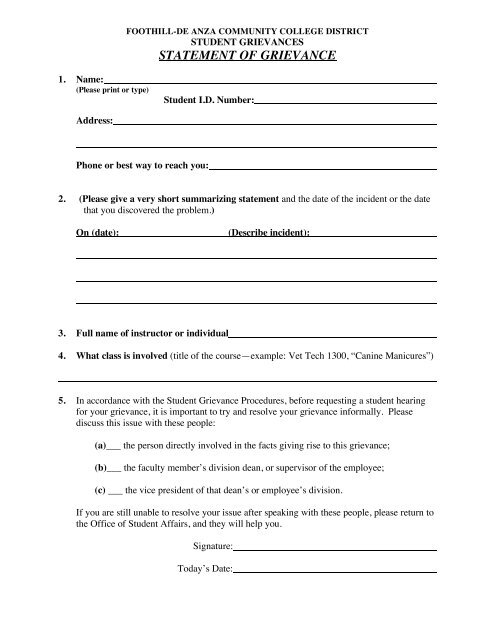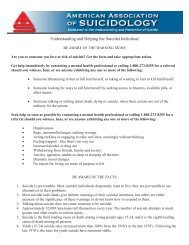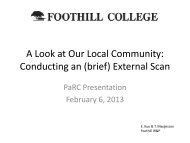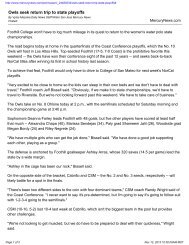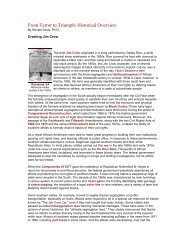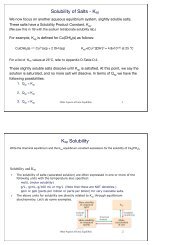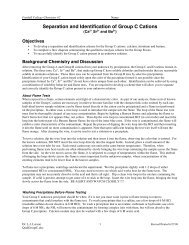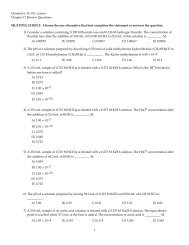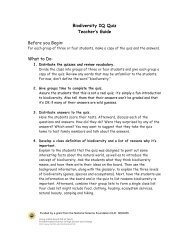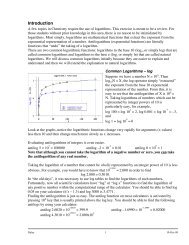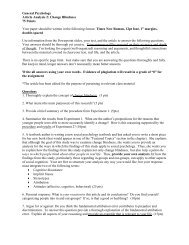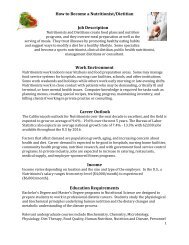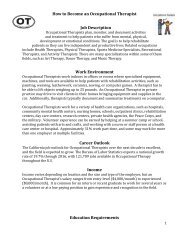Student Grievance FORM - Foothill College
Student Grievance FORM - Foothill College
Student Grievance FORM - Foothill College
You also want an ePaper? Increase the reach of your titles
YUMPU automatically turns print PDFs into web optimized ePapers that Google loves.
1. Name:<br />
(Please print or type)<br />
Address:<br />
FOOTHILL-DE ANZA COMMUNITY COLLEGE DISTRICT<br />
STUDENT GRIEVANCES<br />
STATEMENT OF GRIEVANCE<br />
Phone or best way to reach you:<br />
<strong>Student</strong> I.D. Number:<br />
2. (Please give a very short summarizing statement and the date of the incident or the date<br />
that you discovered the problem.)<br />
On (date): (Describe incident):<br />
3. Full name of instructor or individual<br />
4. What class is involved (title of the course—example: Vet Tech 1300, “Canine Manicures”)<br />
5. In accordance with the <strong>Student</strong> <strong>Grievance</strong> Procedures, before requesting a student hearing<br />
for your grievance, it is important to try and resolve your grievance informally. Please<br />
discuss this issue with these people:<br />
(a)___ the person directly involved in the facts giving rise to this grievance;<br />
(b)___ the faculty member’s division dean, or supervisor of the employee;<br />
(c) ___ the vice president of that dean’s or employee’s division.<br />
If you are still unable to resolve your issue after speaking with these people, please return to<br />
the Office of <strong>Student</strong> Affairs, and they will help you.<br />
Signature:<br />
Today’s Date:
1. Name:<br />
(Please print or type)<br />
Address:<br />
FOOTHILL-DE ANZA COMMUNITY COLLEGE DISTRICT<br />
STUDENT GRIEVANCES<br />
REQUEST FOR HEARING <strong>FORM</strong><br />
Phone: <strong>Student</strong> I.D. Number:<br />
2. I have met with and discussed this issue with these people:<br />
(a)___ the person directly involved in the facts giving rise to this grievance;<br />
(b)___ the faculty member’s division dean, or supervisor of the employee;<br />
Name of dean or supervisor<br />
Date of meeting<br />
(c) ___ the vice president of that dean’s or employee’s division.<br />
Name of VP<br />
Date of meeting<br />
3. Date most recently enrolled as a student:<br />
4. Against whom and about what class are you filing this grievance (give person’s full name;<br />
if a course is involved, course title and number—example: Vet Tec 1300, “Canine Care”)<br />
5. What specific rule, regulation, law, or student right do you allege the college has violated?<br />
(Do not simply state “<strong>Student</strong> Honor Code”. Give the exact rule being violated.) Write a<br />
short statement. “See attached” will not be accepted although you may also add material.<br />
6. What facts do you believe established the violation? (Do not simply write “see attached”)<br />
7. What remedy do you request?<br />
8. Are there any documents you wish to have considered? If so, please attach a copy of the<br />
document(s) to this form.<br />
Signature:<br />
Date:
FOOTHILL-DE ANZA COMMUNITY COLLEGE DISTRICT<br />
REQUEST FOR GRADE CHANGE<br />
FAMILY EDUCATIONAL RIGHTS AND PRIVACY ACT (FERPA) WAIVER<br />
AND BURDEN OF PROOF<br />
"I understand that a hearing regarding my<br />
grade will necessarily require several college employees who are not my instructor to have<br />
access to my student records or parts thereof. I hereby authorize that access and to that extent<br />
waive my privacy rights under federal and state laws (FERPA)." I acknowledge that to<br />
accomplish a change in grade I must prove to the satisfaction of the majority of the hearing body<br />
that the grade is the result of mistake, fraud, bad faith or incompetence, given the following<br />
definitions:<br />
"Is the result of" means that the student has proven a causal connection between the mistake,<br />
fraud, bad faith or incompetence, and the grade. Proof of mistake, etc., without proof that the<br />
mistake, etc., caused the grade, does not satisfy the student's burden of proof.<br />
"Proof to the satisfaction of the hearing body" means the student has demonstrated mistake,<br />
fraud, bad faith or incompetence, by a preponderance of the evidence presented to the hearing<br />
body. The evidence taken as a whole must preponderate in favor of the student and against the<br />
instructor to warrant a finding for the student. Each of these hearings will start with the<br />
presumption that the grade assigned was correct. Absent evidence tilting the scale in favor of the<br />
student, relief is unwarranted.<br />
"Evidence" means competent testimony and authenticated documents. Testimony is competent<br />
if it is based on personal knowledge. Speculation, guesswork, and supposition are not competent<br />
as testimony. Personal knowledge means knowledge acquired through any of the witnesses five<br />
senses: she saw it, heard it, touched it, tasted it, smelled it. The hearing body will decide<br />
whether hearsay testimony or documents are sufficient proof. Generally, hearsay can be<br />
sufficient proof if the body decides that it is reliable evidence. Documents are authenticated if<br />
the body is satisfied from the evidence that the document is in fact what it purports to be.<br />
Legal Standard: “Mistake, fraud, bad faith and incompetence” each have their own legal<br />
definition. The application of these concepts may vary depending on context, generally, (a)<br />
those alleging error in the recordation of the grade; and (b) those alleging error in the decision<br />
about what the grade should be.<br />
Mistake means an unconscious ignorance or forgetfulness of a fact, past or present,<br />
material to the situation; or belief in the present existence of a thing material to the situation<br />
which in fact does not exist, or belief in the past existence of the thing, when in fact it never<br />
existed.<br />
Fraud is the intentional, false representation of a fact, which statement is relied upon by<br />
the student, where the student takes action in reliance thereon and incurs the challenged grade as<br />
a result.<br />
Bad faith means that the grade is intentionally based on criteria which are not valid<br />
measures of academic performance, such as the instructor basing the grade on how the student<br />
looked or smelled, or on a refusal to go on a date.<br />
Incompetence means that the grade is the result of the instructor not being mentally<br />
competent to make the grading decision. This would require expert medical testimony of a<br />
psychiatric or psychological condition rendering the person unfit to make normal decisions.<br />
Signature of student: Date:


